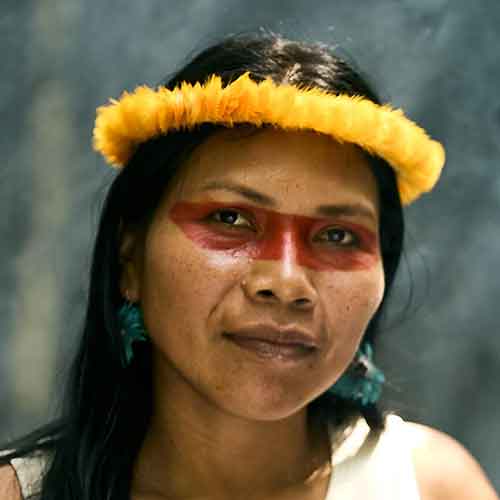Have Questions? We have answers.
Contact UsRaíces, Resiliencia, Resistencia: Building Coalitions to Protect Mother Earth
Save the Date: April 14-15, 2026
RSVP and More Information Coming Soon
Join MSU Denver, the Department of Chicana/o Studies, and the 1 Book/1 Project/2 Transform program on April 14 & 15, 2026 for a powerful two-day series of events with Nemonte Nenquimo and Mitch Anderson, authors of We Will Be Jaguars: A Memoir of My People. Nenquimo, an Indigenous leader of the Waorani Nation of Ecuador and TIME 100 honoree, and Anderson, co-founder of Amazon Frontlines, share their story of resistance, environmental justice, and cultural survival.
This year’s Richard T. and Virginia M. Castro Distinguished Visiting Professorship celebrates Indigenous voices and global movements for environmental and social transformation. Events will include campus discussions, community panels, and a public keynote with cultural performances. These events are open to all MSU Denver students, faculty, staff, and the broader community.
Nemonte Nenquimo
Born into the Waorani tribe of Ecuador’s Amazon rainforest—one of the last to be contacted by missionaries in the 1950s—Nemonte Nenquimo had a singular upbringing.
She was taught about plant medicines, foraging, oral storytelling, and shamanism by her elders. At age fourteen, she left the forest for the first time to study with an evangelical missionary group in the city. Eventually, her ancestors began appearing in her dreams, pleading with her to return and embrace her own culture. She listened.
Two decades later, Nemonte emerged as one of the most forceful voices in climate change activism. She has spearheaded the alliance of indigenous nations across the Upper Amazon and led her people to a landmark victory against Big Oil, protecting over a half million acres of primary rainforest. Her message is as sharp as a spear—honed by her experiences battling loggers, miners, oil companies and missionaries.
In We Will Be Jaguars, she partners with her husband, Mitch Anderson, founder of Amazon Frontlines, digging into generations of oral history, uprooting centuries of conquest, hacking away at racist notions of indigenous peoples, and ultimately revealing a life story as rich, harsh, and vital as the Amazon rainforest herself.

A Collaboration with the 1 Book / 1 Project / 2 Transform Program
This year, the MSU Denver community joins together around We Will Be Jaguars: A Memoir of My People by Nemonte Nenquimo and Mitch Anderson—a powerful story of resistance, identity, and environmental justice in the Amazon. Nenquimo, a celebrated Indigenous leader from the Waorani Nation of Ecuador, and Anderson, co-founder of the nonprofit Amazon Frontlines, share a transformative memoir that calls readers to reimagine our relationship with the Earth and each other.
The visit is presented in collaboration with the 1 Book/1 Project/2 Transform Program, reflecting our shared commitment to social transformation, environmental stewardship, and amplifying global Indigenous voices.
Richard T. and Virginia M. Castro Distinguished Visiting Professorship
Originally started as the Richard T. Castro Distinguished Visiting Professorship was initiated in 1997 to foster multiculturalism, diversity, and academic excellence at Metropolitan State University of Denver. In 2021 the name changed to Richard T. and Virginia M. Castro Distinguished Visiting Professorship to recognize the labor and passion that Virginia Castro brought to the Chicano movement in Denver with Richard. The professorship brings renowned Latinx scholars, artists, and leaders of distinction to MSU Denver to conduct classes, seminars, performances, and lectures for students, faculty, staff, and the larger Denver community.
About Richard T. Castro
Richard T. Castro (1946-1991), an educational and civil rights activist, was one of Colorado’s true champions of disenfranchised communities. From a young street social worker in the early 1970s to executive director of Denver’s civil rights agency, Castro was known as a fighter for human justice and dignity. At 25, Castro became one of the youngest lawmakers ever elected to the House of Representatives, a post he held for five terms. Castro led many struggles for social justice, including opposition to English-only legislation. He was a leading spokesperson in the debate on Mexican immigration. A bust commemorating Castro, sculpted by noted Denver artist Emanuel Martinez, sits in the rotunda of the state capitol.
An Activist at MSU Denver
Castro was an early instructor in what would become the Chicana/o Studies Department at MSU Denver. He was an outspoken leader on the importance of education to meet the needs of a culturally diverse population.
A Denver native, Castro received his bachelor’s degree from MSU Denver and his master’s degree in community organization from the University of Denver. While working his way through DU, he taught part-time at MSU Denver and was a youth counselor. He was a student activist with such organizations as the Displaced Aurarians and the United Farm Workers. During that time, Castro was arrested after intervening when police allegedly beat a Latino youth. The incident sparked an intense awareness of relations between the police and the Latino population. Throughout this incident and others like it, Castro advocated change through education and politics, rather than violence.
Castro once said, “Education’s role in our society cannot be minimized…It is quite probably the most critical investment a people can make.”
The Richard T. Castro Professorship illustrates how MSU Denver continues to build on its multicultural heritage and commitment to diversity. MSU Denver enrolls the highest number of students of color of all the four-year colleges and universities in the state.
The University is a Hispanic-Serving Institution. Becoming an HSI was a 12-year initiative that started in 2007 leading to Metropolitan State University of Denver receiving designation during the Spring of 2019. MSU Denver aspires to become a model Hispanic-Serving Institution by creating and sustaining initiatives that support students as they achieve their academic goals and prepare for their careers.
